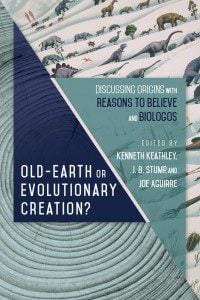 The next chapter in Old Earth or Evolutionary Creation: Discussing Origins with Reasons to Believe and BioLogos looks at the scientific method with focus on methodological naturalism and natural theology. J. B. (Jim) Stump (BioLogos) and Jeff Zweerink (RTB) again take the lead for their two organizations. James Dew moderates the discussion.
The next chapter in Old Earth or Evolutionary Creation: Discussing Origins with Reasons to Believe and BioLogos looks at the scientific method with focus on methodological naturalism and natural theology. J. B. (Jim) Stump (BioLogos) and Jeff Zweerink (RTB) again take the lead for their two organizations. James Dew moderates the discussion.
The discussion starts with methodological naturalism in the practice of science.
It will probably surprise some that Jim sees more issues with methodological naturalism than Jeff, but this is a result of their distinct approaches to the questions of origins. It isn’t that Jim dismisses methodological naturalism, but rather that as a philosopher he takes the long view. There has never been one consistent set of ground rules for the practice of science over the centuries. Methodological naturalism is “a contingent value of most practicing scientists today.” (p. 109) Methodological naturalism, i.e. the restriction of scientific investigation to natural explanations, is an extremely useful approach to science. “Science has proved remarkably successful at figuring out the causes of phenomena that once were explained only by supernatural agents- from thunder and solar eclipses to disease and epilepsy. Of course that doesn’t mean that science will be able to figure out everything in the future. But it should give us pause before thinking we’ve found some phenomenon for which there will never be any natural. explanation.” (p. 109) However, methodological naturalism also shows us as Christians the limits of science – it cannot not probe and explain (establish causes for) that which is above or outside of nature – supernatural.
Jeff actually takes a very similar view on this question: “For practical purposes, scientists must operate largely from a standpoint of methodological naturalism in the sense that explanations for the vast majority of phenomena will flow from God’s ordinary providence described by the laws of physics. However, that does not completely exclude theological considerations.” (p. 113) However, RTB views many creation events including human origins as events that transcend nature. They find that a “soft methodological naturalism provides the most efficacious approach to understanding the world.” (p. 115)
Jeff focuses more on the question of natural theology in his opening essay. Jim adds some reflection in his response.
Jeff finds the traditional approach to natural theology – the idea that nature reveals the existence and attributes of God apart from Scripture – ill advised. God’s authoritative self revelation is found in Scripture. Rather than starting with nature, we should always be starting with Scripture. A foundational premise at RTB is that Scripture, properly interpreted, makes statements that science can address and that these points of agreement are a powerful evangelistic tool demonstrating the authority and inspiration of Scripture. The arrow points from Scripture to nature not from nature to God. A limited for of natural theology, looking for design in nature, has some value, but it should be noted that Scripture provides first evidence for design as God shaped creation out of chaos.
In his response Jeff puts the RTB approach clearly:
Today, many non-Christians no longer accept the validity of the Bible, so tools that aid in buttressing its authority with nonbelievers are important. One popular narrative in our culture is that scientific advances continually show the naivete and unsophisticated knowledge of the biblical authors. However, an articulate message that the biblical description actually accords with the best scientific knowledge and that theologically derived ideas encourage rather than impede scientific progress provides a useful means to counter that narrative and engage a skeptical culture.
RTB scholars have interacted with nonbelieving audiences repeatedly over the last three decades by showing how the basic features of creation described in the Bible align with scientific understanding. Those interactions demonstrate the utility of a concordist perspective in challenging nonbelievers to consider the claims of the Bible regarding the redemptive work of Christ on the cross. (p. 119)
 Jim agrees with Jeff that the traditional approach to natural theology is problematic. He also acknowledges that RTB has been successful with some people, but also notes that their concordist approach seeing scientific conclusions in Scripture isn’t universally persuasive even among the target audience of scientifically literate nonbelievers. He suggests that this is because the data are not clear and that there is always an element of interpretation as we consider Scripture and also the metaphysical implications of observations in nature.
Jim agrees with Jeff that the traditional approach to natural theology is problematic. He also acknowledges that RTB has been successful with some people, but also notes that their concordist approach seeing scientific conclusions in Scripture isn’t universally persuasive even among the target audience of scientifically literate nonbelievers. He suggests that this is because the data are not clear and that there is always an element of interpretation as we consider Scripture and also the metaphysical implications of observations in nature.
So we don’t observe a neutral, natural order. We interpret it, and our interpretations are influenced by the other things we believe. That doesn’t mean that in some postmodern sense every interpretation is just as good as the others. Seeing nature as God’s creation may be an interpretation, but if Christians are right, it is the correct interpretation of what nature is.
Christians who consider the natural order will see it as imbued with purpose, and the more scientists reveal the ordered and lawful behavior of the natural world, the more theologians will revel in God’s provision for creation. Some discoveries may be surprising from certain perspectives. For instance, there are finely tuned physical constants that allow life, and there are evolutionary convergences that seem to render it inevitable that life forms like us develop. These are very hard to square with a perspective that sees nature as purposeless and random. But for Christians, these are not at all inconsistent with what we would expect. (p. 118)
Rather than natural theology a better Christian approach is to consider a theology of nature – theology informs interpretation. This has value for both Christians and skeptics because “we give credence to the Christian way of seeing the world when we show that our beliefs are consistent with what we find there.” (p. 118)
Of course mere consistency is less persuasive to many than the concordism that RTB prefers. It simply doesn’t have apologetic pizazz.
Are there issues with methodological naturalism? If so, what should be changed?
Is there a way that nature can be used to demonstrate the existence of God?
Would you prefer the consistency argument put forth by Jim Stump, the concordist argument of Jeff Zweerink and RTB, or something else?
If you wish to contact me directly you may do so at rjs4mail[at]att.net.
If interested you can subscribe to a full text feed of my posts at Musings on Science and Theology.











